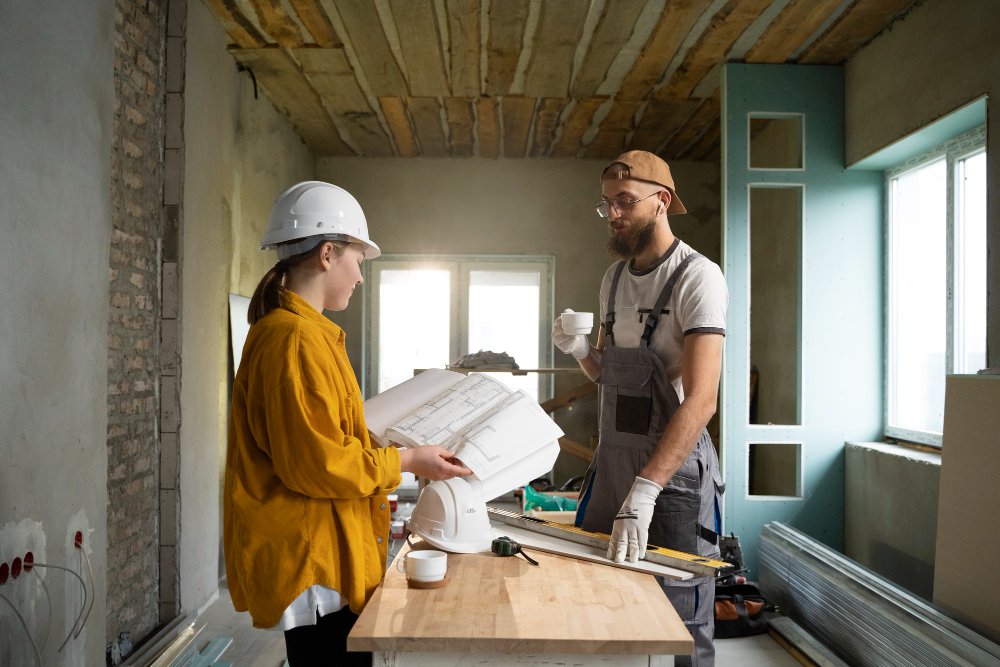5 Things You Should Do Before Remodeling a Residential Property
- 1 5 Things You Should Do Before Remodeling a Residential Property
- 1.1 1. Obtain the Required Permits
- 1.2 2. Plan Your Finances
- 1.2.1 Steps to Create a Budget:
- 1.2.2 Budgeting Tip:
- 1.3 3. Inspect the Property Thoroughly
- 1.3.1 Key Areas to Inspect:
- 1.4 4. Protect Your Belongings
- 1.5 5. Notify Your Neighbors
- 2 Bonus Tips for a Successful Remodeling Project
Whether you’re a homeowner looking to enhance your living space or a professional builder tackling a new project, renovating a residential property can be exciting yet challenging. Success requires careful research, meticulous planning, and strategic execution. Beyond the excitement of seeing your vision come to life, proper preparation ensures your remodelling journey is smooth, cost-effective, and stress-free.
Here are five essential steps to follow before you start remodelling a residential property:
5 Things You Should Do Before Remodeling a Residential Property

1. Obtain the Required Permits
Securing the necessary permits and licenses is one of the most critical steps before remodelling. Failing to do so can lead to fines, project delays, or even having to undo completed work to meet legal requirements. Building permits are not just a bureaucratic requirement—they ensure your project complies with local building codes, ensuring safety for homeowners, workers, and future occupants.
Here are the main types of permits you may need, depending on your project:
- Electrical Permits: For any electrical rewiring, installation of new outlets, or circuit modifications.
- Mechanical Permits: Necessary for HVAC installations, ductwork, or mechanical system changes.
- Plumbing Permits: Required for modifications to plumbing systems, including new pipes, water heaters, or fixtures.
- Pool Permits: These permits are mandatory to add or renovate a swimming pool.
- Demolition Permits: For partial or complete demolition of the property’s walls, structures, or other parts.
Pro Tip: If you wish to avoid unfortunate delays or rejections, consider availing permit expediting services in Florida. These companies have long-standing relationships with jurisdictions. They will review your paperwork and ensure efficient permit processing. Timely obtained building licenses will save you from fines and stress.
2. Plan Your Finances
A home remodelling project can quickly spiral out of control financially without proper planning. Budgeting is critical to avoid overspending and ensure you have enough funds to cover all aspects of the project. Here’s how to manage your remodelling finances effectively:
Steps to Create a Budget:
- Set a Realistic Budget: Evaluate your financial capacity and set a maximum amount you’re comfortable spending.
- Break Down Costs:
- Estimate labour costs based on the complexity of the project and hourly rates.
- Itemize the cost of materials, including flooring, tiles, paint, fixtures, and appliances.
- Account for permit and license fees.
- Include costs for specialized projects like landscaping, roofing, or structural modifications.
- Emergency Fund: Always allocate at least 5-10% of your total budget for unexpected expenses, such as hidden structural issues or fluctuating material prices.
- Financing Options: If your savings fall short, explore financing options such as home equity loans, personal loans, or lines of credit.
Budgeting Tip:
Avoid making impulsive changes during remodelling, as these can inflate costs. Stick to your original plan as closely as possible, and consult with your contractor before making adjustments.
3. Inspect the Property Thoroughly
Inspect your property comprehensively before hammering the first nail or tearing down walls. A detailed inspection helps identify underlying issues that could escalate during remodelling if left unaddressed.
Key Areas to Inspect:
- Exterior: Examine the property’s facade for cracks, peeling paint, damaged siding, and worn-out gutters.
- Interior Walls and Floors: Look for signs of water damage, mould growth, or uneven flooring.
- Plumbing: Test all fixtures, pipes, and drainage systems for leaks, clogs, or corrosion.
- Electrical Systems: Ensure wiring, outlets, and circuits are up to code to prevent hazards like short circuits or electrical fires.
- Roofing: Check for missing shingles, leaks, or structural damage that could lead to water intrusion.
- Pests: Conduct a pest inspection to detect termites, rodents, or other infestations that could compromise your property’s structural integrity.
- Hazardous Materials: Test for harmful substances like asbestos in insulation or lead-based paint in older homes.
Pro Tip: Hire licensed home inspectors for a detailed evaluation. Their expert insights can save you from costly surprises later.
4. Protect Your Belongings
Renovation projects can create a significant mess, including dust, debris, and paint splatters that could damage your belongings. To ensure your furniture and personal items remain safe:
How to Protect Your Belongings:
- Cover with Plastic Sheets: Use heavy-duty plastic or drop cloths to shield furniture, appliances, and flooring from dust and paint.
- Move Items to Storage: Consider temporarily renting a storage unit to house your belongings for larger projects. This prevents accidental damage and creates more space for contractors to work efficiently.
- Secure Valuables: Move fragile or valuable items like artwork, jewellery, and electronics to a safe location away from the construction zone.
Pro Tip: If renting a storage unit isn’t feasible, designate a specific room to store items safely during the remodel.
5. Notify Your Neighbors
While remodelling may be exciting for you, it could inconvenience your neighbours. Noise, dust, and increased foot traffic can disrupt their daily routines. Maintaining a good relationship with your neighbours is essential, so inform them about your plans.
Steps to Notify Neighbors:
- Send a Courtesy Letter: Write a polite note explaining the nature of the project, its estimated duration, and your efforts to minimize disruption.
- Establish Working Hours: Restrict noisy activities to reasonable hours, typically between 9:00 AM and 5:00 PM.
- Clean Up After Work: Ensure contractors tidy common areas like driveways, sidewalks, and shared spaces.
- Offer Flexibility: Be willing to adjust schedules or plans if your neighbours raise valid concerns.
Pro Tip: Building goodwill with your neighbors can lead to smoother collaboration if you need their help during the project, such as shared access to utilities or parking.
Bonus Tips for a Successful Remodeling Project
Hire Reliable Contractors
Choosing the right contractor can make or break your remodelling experience. Look for professionals with relevant experience, certifications, and positive reviews. Request multiple quotes to compare pricing and ensure the contractor understands your vision.
Create a Timeline
A realistic timeline ensures your project stays on track and helps you plan other aspects of your life around the renovation. Break the timeline into phases and set milestones for each stage, such as demolition, installation, and finishing touches.
Emphasize Energy Efficiency
Consider incorporating energy-efficient solutions, such as LED lighting, smart thermostats, and double-glazed windows, into your remodel. These upgrades not only reduce your utility bills but also increase the value of your property.
By following these five essential steps, you can avoid common pitfalls and ensure your remodelling project is a rewarding experience. Preparation is the key to success, from obtaining permits to planning your finances and communicating with neighbours. Your dream home transformation will become a reality with thorough planning and attention to detail.

















